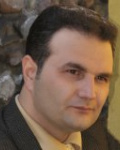| نویسندگان | M Lotfi, S Amini, H Ashrafi |
|---|---|
| نشریه | P I MECH ENG E-J PRO |
| ارائه به نام دانشگاه | بلی |
| شماره صفحات | 824-838 |
| شماره مجلد | 233 |
| نوع مقاله | Original Research |
| تاریخ انتشار | 2019 |
| رتبه نشریه | ISI |
| نوع نشریه | الکترونیکی |
| کشور محل چاپ | ایالات متحدهٔ امریکا |
چکیده مقاله
Decrease of friction in tool–chip contact zone is a key subject in metal cutting operation. Therefore, effect of ultrasonic vibration in this area is analyzed by using experimental and simulation methods. In this study, a theoretical model is firstly developed based on the shear friction model, and then sticking–sliding contact zones plus their contact lengths are defined in order to simulate conventional and ultrasonic-assisted turning. Accordingly, shear angle, sticky length, and cutting forces were measured in experiments as input parameters for the calculation of friction coefficients. As a result, intermittent contact of vibrated tool decreases the time of thermal conduction in tool–chip interface, resulting in a significant reduction in friction coefficient and contact length, particularly, in sticky region.
